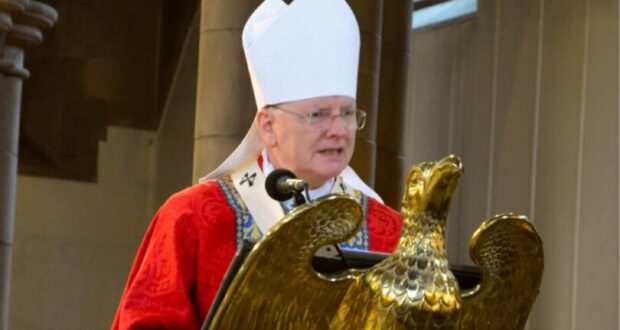✔ أهم حدث بحياتنا، إكتشاف حقيقة أننا كائنات هشة، وسرّ مسحة المرضى تشفي الجسد والروح..
✔ إضفاء الشرعية على الانتحار يُشعر الضعفاء وكبار السن أنهم عبئًا عالآخرين فيشعرون بالضغط فيطلبون إنهاء حياتهم..!!
✔ الرغبة في أخذ الموت بأيدينا بالحقيقة فشل في الثقة بالعناية الإلهية وتتعارض مع حبنا للإله الحي..
الطلبات المستمرة للمساعدة على الانتحار نادرة للغاية عندما يتم تلبية احتياجات الناس الجسدية والنفسية والاجتماعية والروحية بشكل مناسب”.
***
كتب رئيس الأساقفة ليو كوشلي: “ أثناء الاحتضار ، نواجه حقيقة أننا مخلوقات هشة ، نعتمد على الآخرين ، وأننا لسنا مسؤولين في النهاية عن مصيرنا.
اسكتلندا ( LifeSiteNews ) – كتب رئيس أساقفة إدنبرة الكاثوليكيين إلى الكاثوليك يحثهم على معارضة إجراءات الانتحار بمساعدة التي تجري مناقشتها حاليًا في البرلمان الاسكتلندي.
في رسالة رعوية في 15 أكتوبر إلى الكاثوليك في أبرشية سانت أندروز وادنبره ، حذر رئيس الأساقفة ليو كوشلي من أن إضفاء الشرعية على المساعدة على الانتحار “سيزيد من تآكل الطريقة التي يقدّر بها مجتمعنا الحياة البشرية ، والتي تم تقويضها بشكل خطير بسبب الإجهاض القانوني”.
وكتب أن “كل ما نفعله يؤثر على الجميع من أجل الخير أو الشر”.
وأضاف كوشلي: “إن مواقفنا من الحياة في بداياتها وفي نهايتها ستشكل حتماً الطريقة التي نتعامل بها مع الحياة في كل مرحلة بينهما ، وهذا بدوره يؤثر بشكل جيد على نوع المجتمع الذي نبنيه معًا”. “القوانين التي نضعها حول كيفية تعاملنا مع أولئك الذين يقتربون من الموت ستعلم تدريجياً كيف يتم تقييم الحياة البشرية من جميع النواحي.”
حقق عضو البرلمان الاسكتلندي (MSP) ليام ماك آرثر مؤخرًا خطوة مهمة في مساعيه لإضفاء الشرعية على الانتحار بمساعدة البرلمان عندما حصل على دعم 36 من أعضاء البرلمان الاسكتلندي لمسودة اقتراحه “بمساعدة الموت للبالغين المصابين بأمراض مميتة”. يمكنه الآن صياغة مشروع قانون وعرضه على البرلمان في غضون بضعة أشهر.
ورحب ماك آرثر بالأخبار ، فقال إن الدعم من زملائه السياسيين “كان مشجعًا للغاية ، ويظهر الاعتراف المتزايد بالحاجة إلى إنهاء الحظر المفروض على الموت بمساعدة الموت في اسكتلندا”.
سوف ينظر مشروع القانون إلى “تمكين البالغين الأكفاء الذين يعانون من أمراض من أن يتم تزويدهم بناء على طلبهم بالمساعدة لإنهاء حياتهم”.
ومع ذلك ، حذر كوشلي من أن “عواقب” مثل هذا القانون “من المرجح أن تكون خطيرة وواسعة النطاق ، كما تظهر التجربة في بلدان أخرى بالفعل“.
وأشار إلى القوانين الكندية والبلجيكية والهولندية المتساهلة في الانتحار ، مشيرًا إلى كيف بدأ هذا التشريع “بحدود صارمة”. قال كوشلي: “إضفاء الشرعية على القتل الرحيم من شأنه أن يرسل رسالة عبر المجتمع بأسره مفادها أن الحياة التي تنطوي على معاناة جسدية وعقلية ، أو إعاقات جسدية شديدة ، يمكن اعتبارها لم تعد تستحق العيش“.
هذا ليس خطأ من حيث المبدأ فقط – لأنه لا توجد حياة بلا قيمة – فقد يكون له أيضًا تأثير رهيب ومأساوي على الأفراد الضعفاء في أضعف لحظاتهم.
وأضاف رئيس الأساقفة أنه من خلال إضفاء الشرعية على الانتحار بمساعدة ، يمكن “للضعفاء وكبار السن” أن يعتبروا أنفسهم “عبئًا” على الآخرين ، أو حتى “يشعرون بالضغط لطلب المساعدة لإنهاء حياتهم“. جادل كوشلي بأن معارضة المساعدة على الانتحار لا تحتاج بالضرورة إلى معتقد ديني ، لكنه أضاف أنه “في ضوء إيماننا يمكننا أن نرى أسبابًا أكثر إقناعًا لرفض القتل الرحيم”.
بينما يصف مؤيدو المساعدة على الانتحار الإجراءات بأنها عمل مفيد ، عارض كوشلي هذه الأيديولوجية. قال: “إن الرغبة في أخذ الموت بأيدينا ، مهما كانت مفهومة ، هي في الحقيقة فشل في الثقة بالعناية الإلهية ، وهي” تتعارض مع حبنا للإله الحي“. كتب كوشلي: “ربما يكون الموت ، من المفارقات ، أهم حدث في حياتنا ، لأننا نواجه حقيقة أننا كائنات هشة، نعتمد على الآخرين ، وأننا لسنا مسؤولين في نهاية المطاف عن مصيرنا. ” ولاحظ كيف يسلط الكاثوليك الضوء على أهمية الموت بسر المسحة القصوى ، “ولهذا السبب أيضًا يجب أن نحيط الموتى بصلواتنا وأفضل رعاية.”
على الرغم من الدعوات العامة للانتحار بمساعدة سياسيين مختارين ، كتب كوشلي أن “الدليل القاطع هو أن الطلبات المستمرة للمساعدة على الانتحار نادرة للغاية عندما يتم تلبية احتياجات الناس الجسدية والنفسية والاجتماعية والروحية بشكل مناسب”.
وحث الكاثوليك على تسجيل معارضتهم لمقترحات المساعدة على الانتحار ، باعتبارها “مسألة واجب مسيحي” ، من خلال التوقيع على عريضة نظمتها مجموعة حملة Care Not Killing.
واختتم كوشلي بالقول: “إن الحجج من أجل إضفاء الشرعية على” الموت بمساعدة الإنسان “تُقدم على أنها حنونة وإنسانية ، ولكن إذا تم إقرار هذا القانون فسوف يقوض بلا شك القيمة التي يضعها مجتمعنا على حياة الإنسان ، مما يؤثر بشكل عميق على كيفية تعاملنا مع أولئك الذين هم المعاناة وكيف نعتني بمن يحتضر “.
في قائمة المخاطر الواردة في مشروع القانون المقترح ، حذرت Care Not Killing من :
- سيزداد الضغط على الأشخاص الضعفاء أو المعوقين أو المسنين لإنهاء حياتهم قبل الأوان.
- سيزداد عدد الوفيات بمرور الوقت.
- سيتم تمديد القانون لشروط أخرى.
- ستؤثر الضغوط الاقتصادية على عملية صنع القرار.
- في نهاية المطاف ، حتى الأطفال المصابين بأمراض مميتة وربما المعوقين (الذين لا يستطيعون إعطاء الموافقة المستنيرة) من المحتمل أن يكونوا مؤهلين للمساعدة على الموت.
ينظم دعاة آخرون مؤيدون للحياة أيضًا حملات ضد جماعات الضغط على الانتحار. تحث جمعية حماية الأطفال غير المولودين (SPUC) المؤيدين على الاتصال بمسؤولي الخدمات الاجتماعية للتعبير عن معارضتهم لمشروع القانون المقترح.
“هذا القانون خطير للغاية” ، كتب SPUC. كل شخص مسن أو مريض أو معاق في اسكتلندا سيكون في خطر. يجب أن نتحرك الآن للدفاع عن الأفراد المستضعفين في عائلاتنا من قانون يضع الموت قبل الحياة “.
Scottish archbishop urges opposition to assisted suicide bill as a ‘matter of Christian duty’
Michael Haynes – ‘It is in dying that we most clearly confront the fact that we are fragile creatures, dependent upon others, and that we are not ultimately in charge of our own destiny,’ wrote Archbishop Leo Cushley.
The Catholic Archbishop of Edinburgh has written to Catholics urging them to oppose assisted suicide measures currently being discussed in the Scottish Parliament.
In an October 15 pastoral letter to Catholics in the Archdiocese of St. Andrews and Edinburgh, Archbishop Leo Cushley warned that the legalization of assisted suicide would “further erode how our society values human life, which has already been grievously undermined by legal abortion.”
He rejected the notion that death was a purely private matter, writing that “[e]verything we do affects everyone else for good or ill.”
“Our attitudes to life at its very beginnings and at its very end will inevitably shape how we approach life at every stage in between, and this in turn well affect what sort of society we build together,” Cushley added. “The laws we make about how we treat those who are approaching death will gradually inform how human life is valued in every respect.”
Member of the Scottish Parliament (MSP) Liam McArthur recently achieved a significant step in his push to legalize assisted suicide in Parliament when he won the support of 36 MSPs for his “Assisted Dying for Terminally Ill Adults” draft proposal. He can now draft a bill and place it before Parliament in a few months.
Welcoming the news, McArthur said that support from his political colleagues “has been deeply heartening, and demonstrates the growing recognition that there is a need to end the ban on assisted dying in Scotland.”
The bill would look to “enable competent adults who are terminally ill to be provided at their request with assistance to end their life.”
However, Cushley warned that the “consequences” of such a bill are “likely to be serious and wide-reaching, as experience in other countries already shows.”
He referred to the permissive Canadian, Belgian, and Dutch assisted suicide laws, noting how such legislation had started with “strict limits.” “Legalising euthanasia would send a message across the whole of society that lives which entail physical and mental suffering, or severe physical disabilities, can be considered no longer worth living,” said Cushley.
This is not only wrong in principle – for no life is worthless – it could also have a terrible and tragic effect on vulnerable individuals at their weakest moments.
The archbishop added that by legalizing assisted suicide, the “frail and elderly” could see themselves as a “burden” on others, or even “feel pressurised into asking for help to end their lives.”

Opposition to assisted suicide did not necessarily need a religious belief, argued Cushley, but he added that “in the light of our faith we can see even more compelling reasons to reject euthanasia.”
While proponents of assisted suicide describe the measures as a beneficial action, Cushley opposed this ideology. “The desire to take death into our own hands, however understandable, is really a failure of trust in divine providence, and is ‘contrary to our love for the living God’,” he said.
READ: The suicide epidemic is out of control. But meaning and purpose from Christ make life worth living
“Dying is, ironically perhaps, the most significant event of our lives,” wrote Cushley, “because it is in dying that we most clearly confront the fact that we are fragile creatures, dependent upon others, and that we are not ultimately in charge of our own destiny.” He noted how Catholics highlight the importance of death with the sacrament of Extreme Unction, “and it is also why we should surround the dying with our prayers and the best of care.”
Despite the public calls for assisted suicide from selected politicians, Cushley wrote that the “overwhelming evidence is that persistent requests for assisted suicide are extremely rare when people’s physical, psychological, social, and spiritual needs are adequately met.”
He urged Catholics to register their opposition to the assisted suicide proposals, as a “matter of Christian duty,” by signing a petition organized by campaign group Care Not Killing.
Cushley closed by stating: “The arguments for legalising ‘assisted dying’ are presented as being compassionate and humanistic, but if this law is passed it will undoubtedly further undermine the value our society places on human life, profoundly affecting how we treat those who are suffering and how we care for those who are dying.”
Listing the dangers contained in the proposed bill, Care Not Killing warned that:
1- Pressure will increase on those people who are vulnerable, disabled or elderly to end their lives prematurely.
2- The number of deaths will increase over time.
3- The law will be extended to other conditions.
4- Economic pressures will come to bear on decision making.
5- Ultimately, even terminally ill and possibly disabled children (who are unable to give informed consent) are likely to eligible to be helped to die.
Other pro-life advocates are also organizing campaigns against the assisted suicide lobby. The Society for the Protection of Unborn Children (SPUC) is urging supporters to contact their MSPs to voice opposition to the proposed bill.
“This bill is extremely dangerous,” wrote SPUC. “Every elderly, sick or disabled person in Scotland will be at risk. We must act now to defend the vulnerable members of our families from a law which will put death before life.”
 Agoraleaks Agoraleaks
Agoraleaks Agoraleaks







